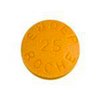 | Endep Active Ingredient: Amitriptyline Endep is a medicine used to treat patients with depression. |
INDICATIONS
Endep is a tricyclic antidepressant used to treat depression and chronic pain. Endep improves the symptoms of depression by correcting the balance of the chemicals in your brain such as norephinephrine and serotonin. These chemicals help improve the mood of the patient and cope with depression.
INSTRUCTIONS
Use Endep as directed by your doctor.
- Endep may be taken with food or on an empty stomach.
- Do not take the medication in larger amounts, or take it for longer than recommended by your doctor.
- Avoid eating grapefruit or drinking grapefruit juice while taking Endep.
- Do not stop using Endep without first talking to your doctor. You may need to use less and less before you stop the medication completely. Stopping this medication suddenly could cause you to have unpleasant side effects.
- Endep may take up to 30 days to control symptoms of depression. Continue to use Endep even if you feel well. Do not miss any doses.
- Talk with your doctor if your symptoms do not improve after 4 weeks of treatment.
- If you need to have any type of surgery, tell the surgeon ahead of time that you are taking Endep. You may need to stop using the medicine for a short time.
- If you miss a dose of Endep, take it as soon as possible. If it is almost time for your next dose, skip the missed dose and go back to your regular dosing schedule. Do not take 2 doses at once.
DOSAGE
The dosage for Endep depends on the condition of the patient. Only the doctors can decide on how much the dosage should be given to a patient. Usually a low dose of Endep is given at a certain period and will gradually increase depending on the tolerance and improvement of the patient.
Initial dosage usually starts at 75 milligrams up to 159 milligrams a day which is divided in smaller doses. For confined patients in hospitals, doctors usually administer 100 to 200 milligrams a day.
Elderly patients are usually provided with low dosage since they are not capable of the tolerance because of their age. Doctors usually reduce the dosage as the patient improves. Constant monitoring of the patient’s condition is required so as to determine if the dosage should be increased or decreased.Ask your health care provider any questions you may have about how to use Endep.
STORAGE
Endep should be stored at room temperature away from moisture and sunlight. Avoid storage at temperatures above 30°C (86°F). Keep Endep out of the reach of children.
MORE INFO:
Active ingredient: Amitriptyline.
Amitriptyline was approved by the FDA in May 1983.
Do NOT use Endep if:
- you are allergic to any ingredient in Endep
- you are currently taking or have taken a monoamine oxidase inhibitor (MAOI) (eg, phenelzine, selegiline) within the last 14 days
- you are taking antihistamines (eg, diphenhydramine), cisapride, droperidol, a ketolide (eg, telithromycin) , a macrolide (eg, erythromycin), mibefradil, or pimozide
- you are recovering from a heart attack.
Contact your doctor or health care provider right away if any of these apply to you.
Some medical conditions may interact with Endep. Tell your doctor or pharmacist if you have any medical conditions, especially if any of the following apply to you:
- if you are pregnant, planning to become pregnant, or are breast-feeding
- if you are taking any prescription or nonprescription medicine, herbal preparation, or dietary supplement
- if you have allergies to medicines, foods, or other substances
- if you have a history of mental illness (eg, bipolar disorder, mania, manic-depression), or have considered or attempted suicide
- if you have alcoholism or regularly consume 3 or more alcoholic beverages per day
- if you have glaucoma, an irregular heartbeat, heart disease, chest pain, liver disease, prostate problems, thyroid disease, or are unable to urinate (urinary retention)
- if you have a history of seizures, epilepsy, or porphyria.
Some medicines may interact with Endep. Tell your health care provider if you are taking any other medicines, especially any of the following:
- MAOIs (eg, phenelzine, selegiline) because they can cause serious, sometimes life-threatening, reactions. Do not take MAO inhibitors with, or within 2 weeks of taking, Endep
- Anticholinergics (eg, scopolamine), bupropion, cimetidine, fluconazole, phenothiazines (eg, chlorpromazine), SSRIs (eg, fluoxetine), terbinafine, or valproic acid because side effects such as blurred vision, difficult urination, drowsiness or sedation, dry mouth, or lightheadedness may occur
- Antihistamines (eg, diphenhydramine), cisapride, droperidol, ketolides (eg, telithromycin), macrolides (eg, erythromycin), mibefradil, pimozide, or streptogramins (eg, quinupristin/dalfopristin) because serious side effects on the heart (eg, racing heartbeat, dizziness, fainting, life-threatening abnormal heartbeat leading to unconsciousness, and lack of heartbeat, may be increased by Endep
- Carbamazepine, thyroid medicines (eg, levothyroxine), or stimulants (eg, albuterol, pseudoephedrine) because their side effects may be increased by Endep
- Warfarin because side effects such as serious bleeding may be increased by Endep
- Clonidine, guanethidine, or guanfacine because the effectiveness of these medicines may be decreased.
This may not be a complete list of all interactions that may occur. Ask your health care provider if Endep may interact with other medicines that you take. Check with your health care provider before you start, stop, or change the dose of any medicine.
Important safety information:
- Endep may cause dizziness, drowsiness, or blurred vision. Do not drive, operate machinery, or do anything else that could be dangerous until you know how you react to Endep. Using Endep alone, with other medicines, or with alcohol may lessen your ability to drive or perform other potentially dangerous tasks.
- Avoid drinking alcohol or taking other medicines that cause drowsiness (eg, sedatives, tranquilizers) while taking Endep. Endep will add to the effects of alcohol and other depressants. Ask your pharmacist if you have questions about which medicines are depressants.
- Endep may cause dizziness, lightheadedness, or fainting; alcohol, hot weather, exercise, or fever may increase these effects. To prevent them, sit up or stand slowly, especially in the morning. Sit or lie down at the first sign of any of these effects.
- Involuntary and uncontrollable movements may develop in patients taking Endep. Occurrence is highest among the elderly, especially women. The risk of developing these involuntary movements and the likelihood they will become permanent are increased with long-term use and with high doses. However, it is possible to develop these symptoms after short-term use at low doses. Contact your health care provider at once if any of the following occur: involuntary movements of the tongue, face, mouth, or jaw (eg, protrusion of tongue, puffing of cheeks, puckering of mouth, chewing movements), sometimes accompanied by involuntary movements of the arms and legs.
- Endep may cause sensitivity to sunlight. Avoid prolonged exposure to the sun and other ultraviolet light (eg, tanning beds). Use sunscreens and wear protective clothing until tolerance is determined.
- Do not become overheated in hot weather or during exercise or other activities since heatstroke may occur.
- Diabetes patients - Endep may affect your blood sugar. Check blood sugar levels closely. Ask your doctor before you change the dose of your diabetes medicine.
- Before you have any medical or dental treatments, emergency care, or surgery, tell the doctor or dentist that you are using Endep.
- Use caution in the elderly; they may be more sensitive to its effects, especially lightheadedness upon standing; rapid heartbeat; breathing problems; difficult urination; and constipation.
- Pregnancy and breast-feeding: Endep has been shown to cause harm to the human fetus. If you plan on becoming pregnant, discuss with your doctor the benefits and risks of using Endep during pregnancy. Endep is excreted in the breast milk. Do not breastfeed while taking Endep.
All medicines may cause side effects, but many people have no, or minor, side effects.
Check with your doctor if any of these most common side effects persist or become bothersome:
Blurred vision; change in sexual desire or ability; constipation; diarrhea; dizziness; drowsiness; dry mouth; headache; loss of appetite; nausea; tiredness; trouble sleeping; weakness.
Seek medical attention right away if any of these severe side effects occur:
Severe allergic reactions (rash; hives; itching; difficulty breathing; tightness in the chest; swelling of the mouth, face, lips, or tongue); chest pain; confusion; dark urine; delusions; difficulty speaking or swallowing; fainting; fast or irregular heartbeat; fever, chills, or sore throat; hallucinations; new or worsening agitation, anxiety, panic attacks, aggressiveness, impulsiveness, irritability, hostility, exaggerated feeling of well-being, restlessness, or inability to sit still; numbness or tingling in an arm or leg; one-sided weakness; seizures; severe or persistent dizziness or headache; severe or persistent trouble sleeping; slurred speech; suicidal thoughts or actions; tremor; trouble urinating; uncontrolled muscle movements (eg, of face, tongue, arms, legs); unusual bleeding or bruising; unusual or severe mental or mood changes; vision problems; yellowing of the skin or eyes.
This is not a complete list of all side effects that may occur. If you have questions about side effects, contact your health care provider.
 WellbutrinWellbutrin (bupropion) is an antidepressant medication. It works in the brain to treat depression.as low as $1.96
WellbutrinWellbutrin (bupropion) is an antidepressant medication. It works in the brain to treat depression.as low as $1.96 ZybanZyban is an antidepressant medication. Zyban is used to help people stop smoking by reducing cravings and other withdrawal effects.as low as $0.65
ZybanZyban is an antidepressant medication. Zyban is used to help people stop smoking by reducing cravings and other withdrawal effects.as low as $0.65 LithiumLithium Carbonate is indicated for the treatment of manic episodes of manic-depressive illness.as low as $0.44
LithiumLithium Carbonate is indicated for the treatment of manic episodes of manic-depressive illness.as low as $0.44 LexaproLexapro is used for treating depression or generalized anxiety disorder.as low as $0.32
LexaproLexapro is used for treating depression or generalized anxiety disorder.as low as $0.32 EmsamEmsam is used to treat adult patients with depression, also known as major depressive disorder (MDD).as low as $1.09
EmsamEmsam is used to treat adult patients with depression, also known as major depressive disorder (MDD).as low as $1.09 AnafranilAnafranil is used for treating obsessive-compulsive disorder.as low as $0.36
AnafranilAnafranil is used for treating obsessive-compulsive disorder.as low as $0.36